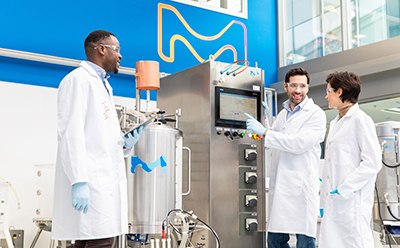Selecting Proteinase K for Large Scale Applications
Proteinase K (ProK) in large-scale Applications
Proteinase K is a broad-spectrum serine protease widely used in large-scale biotechnology and diagnostic manufacturing. Its exceptional stability and activity under harsh conditions make it ideal for nucleic acid purification, viral inactivation, and removal of contaminating proteins in biopharmaceutical, forensic, food safety, and environmental testing workflows. Commonly used in automated DNA/RNA extraction systems and manufacturing-compliant processes, Proteinase K ensures reliable sample preparation and consistent assay performance while supporting scalable, high-throughput applications where enzyme quality, reproducibility, and regulatory compliance are critical to successful commercial assay development.

Key bulk proteinase K parameters include:
- Specific activity (e.g., units/mg): Critical for lot-to-lot consistency. The activity can vary depending on the source, purity, and manufacturing process. It is important to select proteinase K with a high specific activity level to ensure optimal performance in the intended application.
- Purity: Typically ≥95% by SDS-PAGE or HPLC; must confirm absence of contaminating proteases or nucleases. Purity is important to ensure the absence of contaminants or other impurities that could interfere with downstream applications. High purity proteinase K is recommended for large-scale applications to minimize the risk of contamination or interference.
- Stability profile: Proteinase K should be stable under various conditions, such as different pH levels and temperatures, to ensure optimal performance and a longer shelf life in dry and liquid formulations. ProK formulations should show tolerance to heat, pH, and inhibitors used in your assay.
- Formulation: Lyophilized powder vs. solution (glycerol, buffer, stabilizers). Formulation determines Proteinase K’s stability, usability, and scalability. Lyophilized powder provides long-term shelf life, transport stability, and flexible reconstitution, while liquid formulations with glycerol or buffers support automation, consistent dosing, and immediate integration into high-throughput or continuous large-scale manufacturing workflows.
- Origin and production method: Native (Tritirachium album) vs. recombinant (e.g., E. coli, Pichia pastoris). The manufacturing process used to produce proteinase K is also important. The process should ensure consistent activity, specificity, purity, and stability of the product.
- Activity in relevant conditions: Verify that the Proteinase K formulation maintains optimal performance within your assay’s specific buffer composition, temperature range, salt concentration, and detergent levels to ensure consistent enzymatic efficiency, reproducibility, and stability across large-scale or automated processing environments.
Product Listings
Sample sizes are available for most proteinase K products.

Selecting a supplier for proteinase K requires careful consideration of several factors to ensure that the proteinase K received meets the required quality standards. The following steps should be considered when selecting a supplier:
Supply chain
A great reagent is useless if you can’t depend on it. Consider supplier stability and reputation (avoid sole reliance on small startups). Also consider lead times and regional distribution (customs and cold-chain logistics can be major bottlenecks). Your reagent partner should also be able to supply agreements or long-term contracts to lock pricing and availability early. Finally, even if you have a primary source, consider a secondary supplier or dual sourcing. Its good practice in large-scale applications to always validate at least one backup manufacturer to protect against supply disruptions.
Manufacturing process
The supplier should have a well-documented and standardized ISO manufacturing process for proteinase K to ensure consistent quality and performance. This should include sourcing of raw materials, quality control checks at various stages of production and compliance with relevant regulations. Assess the supplier’s production capacity: Can they meet multi-kilogram or liter-scale demands consistently? They should be able to provide lot-to-lot consistency testing, ideally validated through multiple lots. Also ascertain their custom formulation capabilities (e.g., pre-buffered, specific concentrations, glycerol-free for lyophilization) depending on your large-scale application needs.
Certification and compliance
The supplier should be certified and compliant with relevant quality standards, such as ISO or GMP, and should provide documentation of their compliance. They should be able to give batch traceability and documentation (Certificates of Analysis, Batch Records, QC data) on demand or in support of audits.
Technical and logistical support
Good suppliers act as partners in assay development.The supplier should have a technical support team that can provide advice and support on the use of proteinase K in the intended application, troubleshoot issues, and provide assistance with any regulatory or compliance concerns. They should be able to supply technical data packages (activity curves, stability studies, pH profiles) as well as QC data and reference lots.
Reputation and track record
For commercial assays, reagent supply must be scalable, traceable, and compliant. Be sure that the supplier has experience and reputation in large-scale applications and is known to have a reliable global supply chain.
Quality Control (QC) & Quality Management System (QMS)
The supplier should have a robust quality control system in place to ensure the quality and consistency of their proteinase K. This may include testing for activity, specificity, purity, stability, and other relevant parameters.
It is important to source proteinase K from suppliers with strong QMS in place because the quality and consistency of these materials can significantly impact the reliability and reproducibility of downstream processes and products. Suppliers with strong QMS ensure that their products are manufactured and tested to high-quality standards. They implement rigorous quality control procedures at every stage of the production process, from raw material sourcing to final product release, to ensure that the final products meet specifications and are consistent from batch to batch. They also provide detailed documentation and traceability information, allowing customers to track the origin and quality of the materials they receive. By sourcing critical raw materials from suppliers with strong QMS, researchers and manufacturers can minimize the risk of quality issues and ensure the reproducibility of their results.
Cost
The cost of proteinase K from the supplier should also be considered but should not be the only factor in selecting a supplier. It is important to balance the cost with the desired quality and performance to select the optimal supplier for the intended application.
In summary, selecting a supplier for proteinase K as production raw materials involves considering factors such as quality control, manufacturing process, certification and compliance, technical support, reputation and track record, supplier’s quality management system and cost.
Other Proteinase K Information
To learn how Proteinase K is used blood DNA/RNA extraction, visit How Proteinase K can be used in Blood DNA Extraction.
To learn how Proteinase K is used blood DNA/RNA extraction, visit How Proteinase K can be used in Tissue Samples.
To learn different Proteinase K protocols here visit Guide on How to Use Proteinase K in Different Procedures
How to Order Large Quantities of Proteinase K
Bulk capabilities and custom pack sizes of Proteinase K are available for your specific application. Lot reservations and other manufacturing planning considerations can be discussed with our dedicated support team. Complete the form to receive more information on what we have to offer including sample sizes and pre-packs.
References
To continue reading please sign in or create an account.
Don't Have An Account?